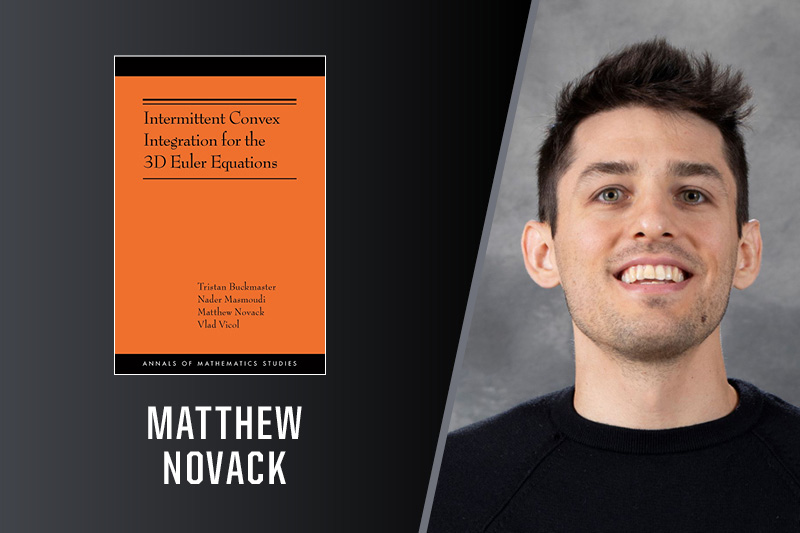November 8, 2023
In Print: ‘Intermittent Convex Integration for the 3D Euler Equations’

Matthew Novack, assistant professor of mathematics, and his new book, “Intermittent Convex Integration for the 3D Euler Equations.”
Purdue faculty dedicate countless hours to exploring the frontiers of their respective fields, pushing the boundaries of knowledge and contributing to the ever-evolving landscape of academia. To celebrate our faculty’s excellence in scholarship, Purdue Today’s weekly book series will highlight faculty expertise across a diversity of subjects and disciplines. Today’s feature focuses on Matthew Novack, assistant professor of mathematics, and his book, “Intermittent Convex Integration for the 3D Euler Equations.”
Publication Title
Intermittent Convex Integration for the 3D Euler Equations
Purdue Author
Matthew Novack
Authors
Tristan Buckmaster, Nader Masmoudi, Matthew Novack, Vlad Vicol
Publisher
Princeton University Press
Publication Date
July 11, 2023
About the Book (from the publisher)
To gain insight into the nature of turbulent fluids, mathematicians start from experimental facts, translate them into mathematical properties for solutions of the fundamental fluids partial differential equations, and construct solutions to these PDEs that exhibit turbulent properties. This book belongs to such a program, one that has brought convex integration techniques, inspired by John Nash’s pioneering work in geometry, into hydrodynamics. Convex integration techniques have been used to produce solutions with precise regularity, which are necessary for the resolution of the Onsager conjecture for the 3D Euler equations, or solutions with intermittency, which are necessary for the construction of dissipative weak solutions for the Navier-Stokes equations. The main technical contribution of this book is to develop convex integration techniques at the local rather than global level. This localization procedure functions as an ad hoc wavelet decomposition of the solution, carrying information about position, amplitude, and frequency in both Lagrangian and Eulerian coordinates.
About the Purdue author
Matthew Novack is an assistant professor of mathematics at Purdue University. Previously, he was a postdoctoral fellow at New York University; Mathematical Sciences Research Institute, now known as SLMath; and the Institute for Advanced Study.
Novack’s research interests lie in partial differential equations, particularly those arising in fluid dynamics and related fields. His current research is partially funded by the National Science Foundation.

